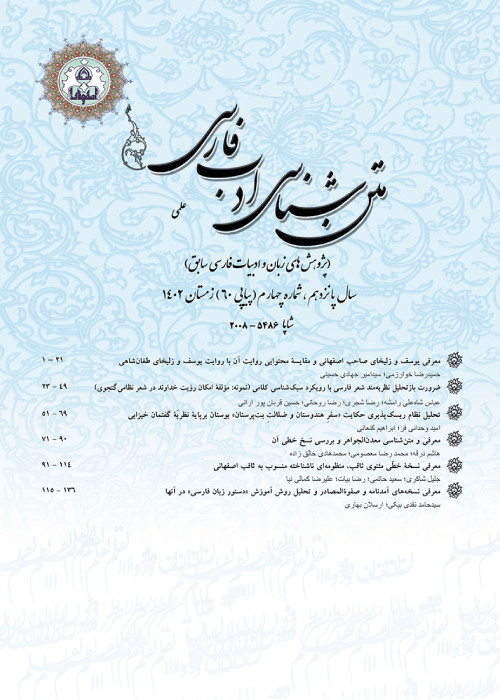Mythical Critique of the Mystical Memoirs of Manaqib al-Arefin, Madan al-Dorar, Ferdows al-Murshediyeh, and Safvat al-Safa'a based on the Theory of James Frazier
Mythology is an attempt to understand the ancient and strong roots of the people's cultural foundation. In this research, by the descriptive-comparative method of repetition and reflection of mythological rituals in a new era in the form of mystical acts and rituals, four mystical memoirs of Manaqib al-Arefin, Madan al-Dorar, Ferdows al-Murshediyeh, and Safvat al-Safa'a have been described using James Frazier's theory. The tradition of entrusting the body to stingers as religious and ritual ceremonies in the mystery and dissemination has a mythical aspect. Mystics, like humans- gods of mythical texts rain down with the capture of the forces of nature, and in the role of the human being, carry the burden of sins, disasters, and the sufferings of the general public. According to Frazier, the rituals of mystics’ death correspond to the cycle of nature, and their kingdom spirit is embodied in the existence of the living person. Words in the mystic-coded language based on homeopathic charm cause similar meanings. According to the diverging charm, separated fragments of mystics such as saliva, hair, blessing, clothes, and cloaks transmit the empathic effect remotely, and the mystic can impose his will on healing the sick or winning the war. Also, according to this theory, one of the reasons for the avoidance of eating meat is that the harms and undesirable states that are believed to exist in foods are caused by people.
Some customs are rooted in mythological beliefs and have subconsciously influenced and influenced the cultural community. These cultural elements have taken on a new guise in the mystical experiences of the Sufis and have been re-created in a disguised way according to the requirements of the time. The study of mystical memoirs shows that some mythical rituals are related to mystical practices and rituals in mystical texts and some of these mythical beliefs are manifested as a sacred virtue in the creation and character of godly human beings.
James Frazier in his book the Golden Branch has referred to many rituals and mythological archetypes that are the basis of this study. This descriptive-comparative study seeks to answer two questions: 1) which mythical rituals and beliefs have been used in mystical memoirs? 2) Which mythical beliefs have evolved in mystical memoirs and have been expressed in the form of mystical thoughts? It is worth mentioning that in this study, several mystical memoirs are cited, including Manaqib al-Arefin, Safvat al-Safa, Madan al-Dorar, and Ferdows al-Murshediyeh.
This study reflects mythological beliefs in mystical memoirs. The test of putting the body to the bites is one of the rituals of mystery and admiration. This is parallel to the mythical texts in mystical memoirs. The purpose of this type of austerity can also be considered as a breath of pain and a test of the resilience of the incumbents, which leads to their immortality and confirms their readiness to bear a great responsibility. Thus, the beliefs of the primitive people regarding the power of kings and supernatural persons, dressed in other clothes, have been repeated in mystical texts, and the power of mystics, like their predecessors, has no boundaries in influencing the circulation of nature.People who do not embody the power of God bring prosperity to themselves and other people by appealing to the supernatural. Sometimes mystics or human gods, according to Frazier's theory, play the role of rebellious human beings and, as representatives, bear suffering, calamities, hardships, and even death. These sacrifices, which were considered in the mythical mirrors of God, are also the perfect mystic in perfect mystical memoirs, and sometimes the followers of the elders are another example of rebellious and sacrificial personalities in the memoirs. On the subject of the death of man-God, there are similarities between mythological and mystical texts; the ceremony of death or ‘wedding’ in mystical memoirs can be considered as a metamorphosis of the celebration of prayer for spirits.The adaptation of the life cycle to the nature and gender of non-living beings, as well as the heavenly incarnation of the spirits of the dead in the existence of living beings, are among the issues that are evident in both memoirs and myths. Another point about the death of man-God is that some mystics believe that God has the power to continue to make changes in the life cycle of the ancient gods and to oppose external forces such as death. Along with the view of the world in the conquest of the divine forces, which is proposed by the idea of man-God, the primitive man introduces the new idea of natural law. According to this view, in homeopathic magic, the association of meanings based on similarity has led to the expansion of the range of cryptic words among Sufis. Another example of the association of similar meanings about the voice of non-living beings and their interpretation is mentioned in mystical texts. In this regard, sharp contagion refers to the association of meaning based on proximity.
In mystical texts, according to Frazier's mythological view, it is believed that the components separated from the existence of mystics such as saliva, hair, blessing, clothes, and cloaks, after maintaining physical contact with their owners, still maintain an empathetic connection with the body. The general public also uses these devices to cure illnesses and win the war, based on the assurance that there is still empathy between it and its predecessor. Also, based on this magic, not only good effects but also adverse effects of foods such as meat are affected by people, therefore, this factor can be considered as one of the reasons for Sufis to avoid eating meat.
- حق عضویت دریافتی صرف حمایت از نشریات عضو و نگهداری، تکمیل و توسعه مگیران میشود.
- پرداخت حق اشتراک و دانلود مقالات اجازه بازنشر آن در سایر رسانههای چاپی و دیجیتال را به کاربر نمیدهد.




